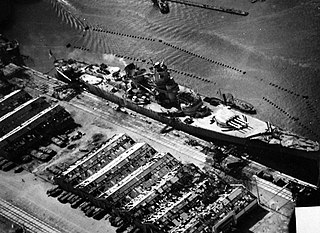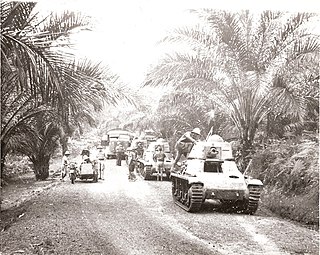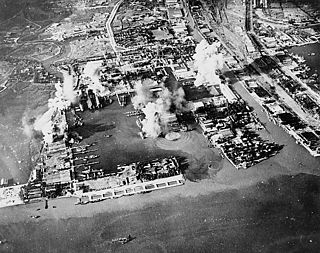 W
WThe Battle of the Atlantic, the longest continuous military campaign in World War II, ran from 1939 to the defeat of Nazi Germany in 1945, covering a major part of the Naval history of World War II. At its core was the Allied naval blockade of Germany, announced the day after the declaration of war, and Germany's subsequent counter-blockade. The campaign peaked from mid-1940 through to the end of 1943.
 W
WThe Naval Battle of Casablanca was a series of naval engagements fought between American ships covering the invasion of North Africa and Vichy French ships defending the neutrality of French Morocco in accordance with the Second Armistice at Compiègne during World War II. The last stages of the battle consisted of operations by German U-boats which had reached the area the same day the French troops surrendered.
 W
WThe bombardment of Cherbourg took place on June 25, 1944, during World War II, when ships from the United States Navy and the British Royal Navy attacked German fortifications in and near the city, firing in support of U.S. Army units that were engaged in the Battle of Cherbourg. In doing so, the Allied naval forces engaged in a series of duels with coastal batteries and provided close support to infantry as they fought to gain control of the city. The bombardment was initially scheduled to last just two hours but it was later extended by an hour to support army units attempting to breaking into Cherbourg's city streets. After the bombardment, German resistance lasted until June 29, when the port was eventually captured by the Allies. Afterwards, the task of clearing the port for use lasted several weeks.
 W
WOperation Cockpit was an attack against the Japanese-held island of Sabang on 19 April 1944. It was conducted by aircraft flying from American and British aircraft carriers, which targeted Japanese shipping and airfields. A small number of Japanese ships and aircraft were destroyed, and one American aircraft was lost. While the attack was successful tactically, it failed to divert Japanese forces from other fronts as had been hoped.
 W
WOperation Crimson was a British-led naval operation in World War II, the objective being simultaneous naval bombardment and aerial strikes on Japanese airfields in the Indonesian cities of Sabang, Lhoknga and Kutaraja, to be launched from aircraft carriers in the Indian Ocean on 25 July 1944.
 W
WOperation Dragoon was the code name for the landing operation of the Allied invasion of Provence on 15 August 1944. The operation was initially planned to be executed in conjunction with Operation Overlord, the Allied landing in Normandy, but the lack of available resources led to a cancellation of the second landing. By July 1944 the landing was reconsidered, as the clogged-up ports in Normandy did not have the capacity to adequately supply the Allied forces. Concurrently, the French High Command pushed for a revival of the operation that would include large numbers of French troops. As a result, the operation was finally approved in July to be executed in August.
 W
WThe Battle of Gabon, also called the Gabon Campaign, occurred in November 1940 during World War II. The battle resulted in the Free French Forces taking the colony of Gabon and its capital, Libreville, from Vichy French forces. It was the only significant engagement in Central Africa during the war.
 W
WThe Battle of Ist was a naval engagement in Adriatic Sea, between the islands of Škarda and Molat, off the island of Ist, on 29 February 1944. The engagement was fought between Free French navy light cruisers and a Kriegsmarine force of two corvettes, two torpedo boats and three minesweepers. The German flotilla had been deployed to escort a freighter. In the ensuing engagement the French managed to destroy the German freighter and a corvette in return for no loss before withdrawing.
 W
WThe Battle of Ko Chang took place on 17 January 1941 during the Franco-Thai War in which a flotilla of French warships attacked a smaller force of Thai vessels, including a coastal defence ship. The battle resulted in a tactical victory by the French Navy over the Royal Thai Navy although the strategic result is disputed. The Japanese intervened diplomatically and mediated a ceasefire.
 W
WThe Attack on Mers-el-Kébir on 3 July 1940, during the Second World War, was a British naval attack on French Navy ships at the naval base at Mers El Kébir, at Oran, on the coast of French Algeria. The attack was part of Operation Catapult, a British plan to neutralise or destroy French ships to prevent them falling into German hands in the aftermath of the Allied defeat in the Battle of France. The British bombardment of the base killed 1,297 French servicemen, sank a battleship and damaged five other ships, for a British loss of five aircraft shot down and two crewmen killed.
 W
WOperation Transom was an attack made by Allied forces against the Japanese-held city of Surabaya on 17 May 1944 during World War II. It was conducted by the British-led Eastern Fleet, and involved aircraft launched from American and British aircraft carriers striking the city's docks and an oil refinery. One American torpedo bomber was shot down.